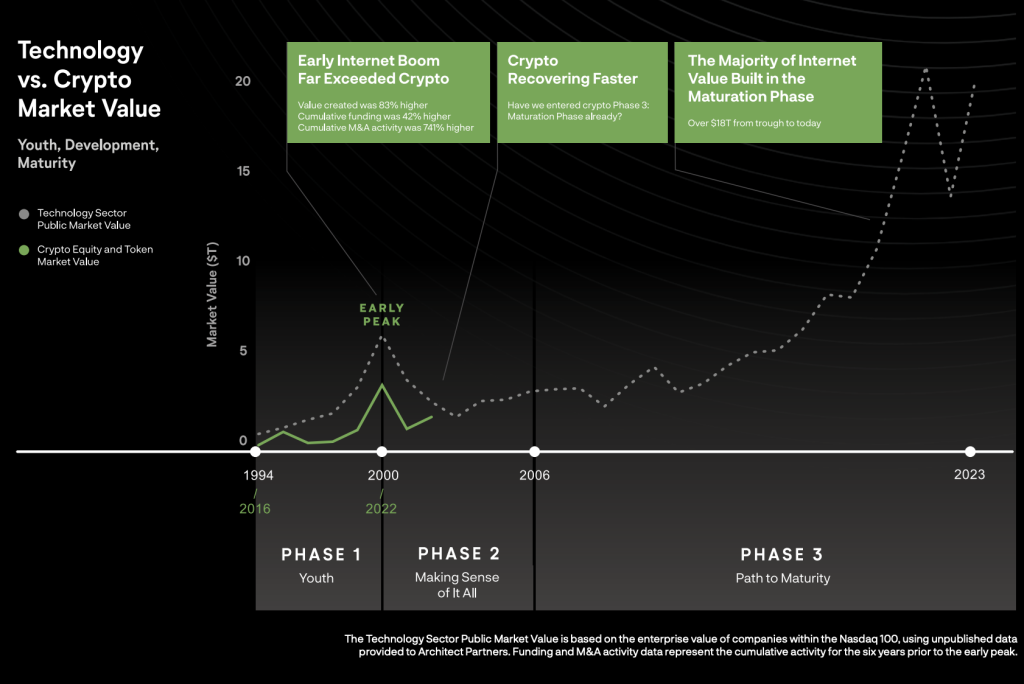What Crypto Can Learn From the Internet’s Playbook

The connection between crypto and the internet is rooted deep in the digital DNA that defines our modern era.
A recent Architect Partners report delves into how the internet’s journey can offer valuable lessons for the development of crypto. It explores the maturation of emerging tech by comparing the internet’s 28-year history with crypto’s initial 8 years.
“These networks alone offer little practical value,” authors Eric Risley and Arjun Mehra wrote. “But just as a blank canvas inspires art, these networks have inspired the creation of countless software applications.”
Risley and Mehra suggest that crypto can learn from the internet’s past — as both share “familial DNA.”
Their report is timely as crypto is still looking to establish itself, despite gaining significant attention from TradFi institutions.
The news tried to make people believe the internet was a “passing fad”
Now they are trying to do the same thing to Crypto and AI. pic.twitter.com/DJb9dOOdur
— Crypto Culture (@CryptoCult_BTC) February 1, 2024
This theme is also examined in billionaire venture capitalist Chris Dixon’s new book titled “Read Write Own: Constructing the Next Era of the Internet.”
The Internet’s Rollercoaster Ride in the Late ’90s
The internet did not seem promising initially but became the foundation for many important modern applications. Yet, it’s ended up serving as the bedrock for numerous crucial applications we rely on today.
Architect Partner’s report highlights that the groundwork for the internet was laid in the 1960s. But a reliable way for computers to communicate with each other was lacking. It wasn’t until March 1992 that the internet protocol suite TCP/IP finally filled that gap.

Birth of Companies We Can’t Live Without Today
Starting with basic web pages, the evolution led to the emergence of platforms like AOL, Yahoo, and Netscape in the mid-1990s, referred to as Web1.
But the story didn’t end there. In the late ’90s, the internet saw a massive influx of investment, driving tech innovation, personal computer adoption, and the development of new software tools.
“Some of today’s most notable leaders were founded, including Amazon, Google, Salesforce, Equinix, Expedia, and Netflix,” the authors wrote. Eventually, as the ’90s wrapped up, over 400 million people used the Internet daily.
Will Crypto Follow the Internet’s Path to Wide Acceptance?
Between 1995 and 2000, big money poured into internet companies, pushing the tech sector’s value to $5.6 trillion by 1999. But it all crashed in 2000, making the skeptics look right.
By 2000, there was a shortage of risk capital, and the skeptics were proven right. Over 74% of what seemed like inflated value vanished by 2002.
Despite challenges, innovation persisted. Facebook, YouTube, Skype, Workday, and DocuSign succeeded by embracing the internet’s capabilities. By 2006, it was clear that the internet was the foundation for almost everything valuable.
“What felt like breakneck innovation actually took 34 years – almost half a lifetime,” the authors said.
The report concludes with a fundamental question: whether crypto will be accepted like the internet or remain an outlier?







